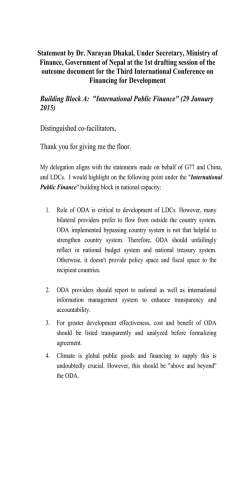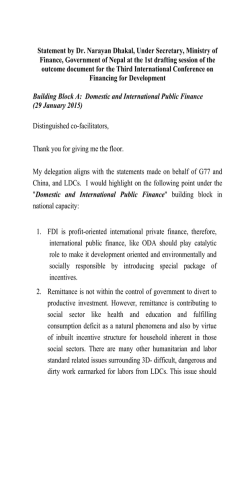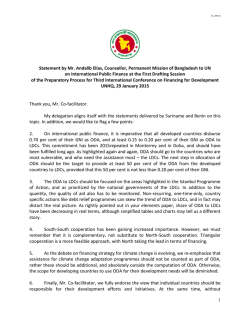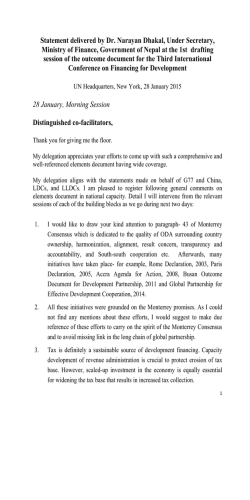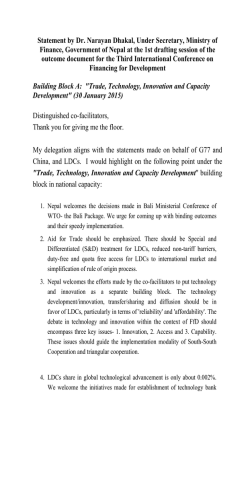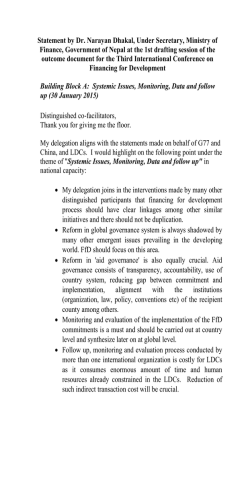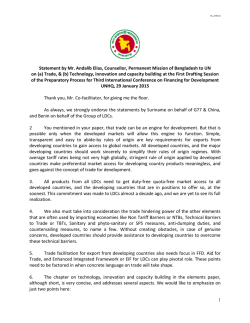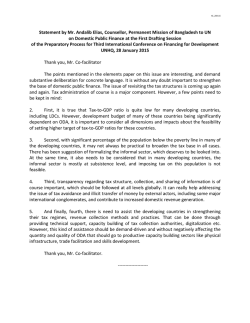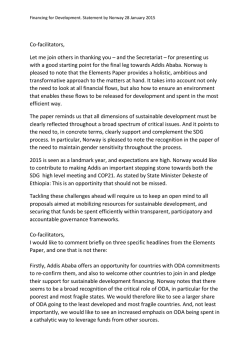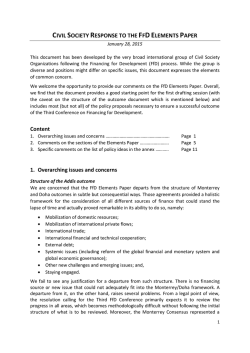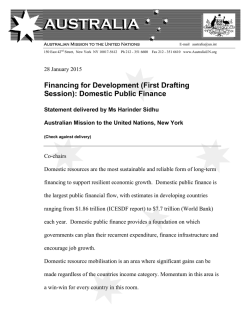
Bangladesh
AE_v280115 Statement by Mr. Md. Mustafizur Rahman, Deputy Permanent Representative of Bangladesh at the general discussion of the First Drafting Session of the Third International Conference on Financing for Development UNHQ, 28 January 2015 Thank you, Mr. Co‐facilitator. I would like to begin by congratulating both of you, Co‐Facilitators, for coming up with the "Elements" paper. This document is indeed comprehensive, yet concise enough to capture almost all issues pertinent to our discussion. 2. In this regard, we endorse the interventions by South Africa and Benin on behalf of the G 77 and China, and the LDCs respectively. Let me re‐state here that financing for development strategy for the future should build on the Monterrey Consensus and the Doha Declaration, and informed by the Post 2015 Development Agenda discourse. In addition, we would like to flag the following points: 3. On domestic public finance, we agree that it is of course important to strengthen the base of domestic public finance. However, two critical issues are intrinsically related: (a) conducive international environment, such as addressing of the issue of tax avoidance and illicit transfer of money by or in connivance with external actors, including some major international conglomerates, and (b) the strengthening of the tax regimes of the LDCs and their revenue collection methods and practices. 4. On private finance, we cannot over‐emphasis that for attracting international private finance, the interlinked issues are capacity building, access to global markets etc. Also, we should not ignore that private finance is mostly profit oriented, thus cannot be substitute for public finance. In all these issues, country ownership would be pivotal. 5. The issue of remittance has been flagged. Reducing the cost of remittance transferring is of key importance. At the same time, rights of migrants deserve our serious scrutiny, as this issue plays a major role in the productivity and ability of migrants to remit. We should not also forget that remittance is by nature private money, which may meet country's foreign currency need, but cannot be used as government resource for undertaking development activities. 6. On international public finance, it is imperative that all developed countries disburse 0.70 per cent of their GNI as ODA, and at least 0.15 to 0.20 per cent of their GNI as ODA to LDCs. This commitment has been repeated in Monterrey and in Doha, and should have been fulfilled long ago. ODA to LDCs should be focused on the areas highlighted in the Istanbul Programme of Action, and as prioritized by the national governments of the LDCs. In addition to the quantity, the quality of aid also has to be monitored. The calculation method of the amount of ODA disbursement needs to be standardized in consultation with the stakeholders. As rightly pointed out in your elements paper, share of ODA to LDCs have been decreasing in real terms, although simplified tables and charts may tell us a different story. 1 AE_v280115 7. As the debate on financing strategy for climate change is evolving, we re‐emphasis that assistance for climate change adaptation programmes should not be counted as part of ODA, rather these should be additional, and absolutely outside the computation of ODA. On trade, we agree with you, as mentioned in your paper, trade can become an engine for development, but only when the developed markets will allow this engine to function. Simple, transparent and easy to abide‐by rules of origin are a key requirement for exports from developing to gain access to global markets. 8. All products from all LDCs need to get duty‐free quota‐free market access to all developed countries, and the developing countries that are in positions to offer so, at the soonest. This commitment was made to LDCs almost a decade ago, and we are yet to see its full realization. 9. Last, but not the least, the systemic issues require major deliberations leading to Addis. Reform of international financing and economic institution are essential if we want to avoid recurrence of the global financial crises. Unfortunately, we are not seeing any concrete steps to break the cartels. The alternative approaches that are now being taken by the major developing countries may help them, but that leave the LDCs even more isolated. We are convinced that the reform and democratization of the IFIs is needed for stability in the global financial system, which will help all regions. The sooner the key players in the IFIs realize that, and act accordingly, the better for the peoples around the world. ‐‐‐‐‐‐‐‐‐‐‐‐‐‐‐‐‐‐‐‐ 2
© Copyright 2026
